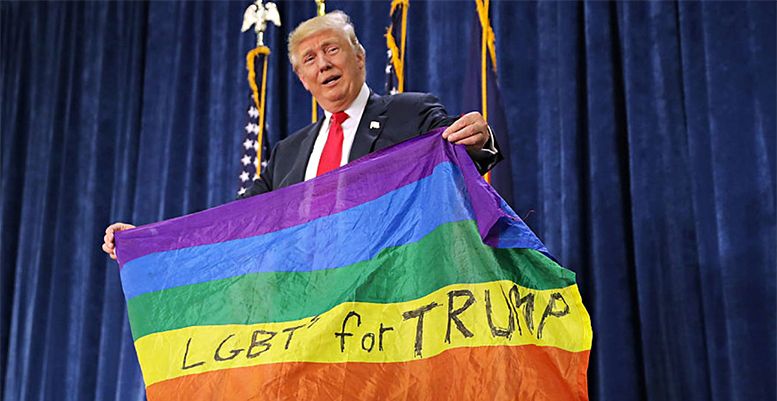By: Keegan O’Brien*/TRT Guest Columnist—
“AS your president, I will do everything in my power to protect our LGBTQ citizens from the violence and oppression of a hateful foreign ideology.”
These were the words of presidential candidate Donald Trump’s at the 2016 Republican National Convention referencing the horrifying shooting massacre at the Pulse nightclub in Orlando, Fla. the month before.
Leaving aside the blatant racism and Islamophobia of his statement, the past year has shown that Trump’s promise couldn’t be further from the truth.
Trump’s first year in office has been a political roller coaster with a seemingly never-ending barrage of attacks against workers, the oppressed, and the planet, punctuated by spontaneous explosions of protest and resistance.
And at a time when public opinion has largely shifted in solidarity with demands for LGBTQ equality, the Trump administration is carrying out policies that threaten to turn back the clock on the rights that have been won and whip up hatred and suspicion that have fueled his bigoted right-wing base of support.
Given the whirlwind of attack coming down from the Trump administration, it’s useful to take stock of the past year and evaluate the landscape of LGBTQ rights under Trump, the response from established LGBTQ political organizations and the possibilities for potential resistance.
***
From attacks against trans people to the defense of “religious liberties,” the Trump administration has made it a point to target the oppressed and vulnerable and stand up for bigotry and discrimination.
Last summer, in a series of classic Trump tweets, the president announced he would be reinstating the military’s ban on transgender people serving in the military, bogusly claiming the military couldn’t afford the high rate of health care costs.
Never mind, of course, the high costs of building the world’s largest nuclear arsenal and military juggernaut. The administration has continued to defend the ban as it’s made its way through the courts.
Secretary of Education Betsy DeVos rescinded Obama-era guidelines requiring schools provide basic civil rights protections to transgender students.
In the context of a school system where trans students are regularly bullied and harassed and already experience disproportionately higher levels of depression and suicide, this decision will have extremely harmful consequences.
Trump has stacked the court system with judicial nominees who are openly and vehemently opposed to LGBTQ rights.
The Justice Department rescinded an Obama-era federal memo declaring trans people are protected under civil rights laws and has come out in support of anti-trans “bathroom bill” legislation.
The bigoted right has taken this as a green light to go on the offensive, using the guise of “religious liberties” and “bathroom bills” to chip away at established civil rights protections across the country at the local, state, and federal level.
In 2017, 16 states introduced legislation to restrict trans people’s right to use the bathroom of their choice, six states attempted to repeal LGBT anti-discrimination laws, and 14 states attempted to remove protections for transgender students.
While the anti-LGBT right hasn’t always been successful, it’s clear that they feel a new wind of confidence in their sails with Trump in the White House.
The administration has provided a set of “religious liberties” guidelines to federal agencies asking them to respect “religious liberty protections” in all levels of the federal government.
The Department of Health and Human Services also created a new agency, the “Division of Consciousness and Religious Freedom” to ensure that the “religious liberties” of providers aren’t violated.
We should be clear, these decisions have nothing to do with protecting religious liberties and everything to do with establishing the right of bigots to practice discrimination and hate.
In the recent Supreme Court case, Masterpiece Cakeshop Ltd. v. Colorado Civil Rights Commission, the administration argued and the court ruled in favor of the cake shop’s right to discriminate against a same-sex couple.
Although the ruling was limited and not the wholesale victory the right wing was hoping for, it sets a dangerous precedent for future cases and gives further confidence to opponents of equality.
Without any explanation, the administration fired the entire Presidential Advisory Council on HIV/AIDS in December and refused to recognize LGBTQ Pride Month in June.
***
The administration’s attacks keep coming, even though there’s been a major shift in the level of cultural acceptance and legal equality in the past decade for LGBTQ people.
At the same time, however, the situation for the most vulnerable queer and trans people, particularly those at the intersections of race, class, gender, and sexual oppression remains extremely precarious and in a state of social crisis.
Nothing demonstrates this more starkly than the level of violence endured by trans women of color. In 2017, 28 transgender people, overwhelming trans women of color, were murdered.
Trans women of color make up 67 percent of homicides against the LGBTQ community and have a life expectancy rate of 35 years.
As a report detailing the simultaneous layers of structural oppression and their effects explains:
“While the details of these cases differ, it is clear that fatal violence disproportionately affects transgender women of color, and that the intersections of racism, sexism, homophobia, and transphobia conspire to deprive them of employment, housing, healthcare and other necessities, barriers that make them vulnerable.”
The picture for young queer people, especially trans youth, is equally disturbing. Although schools should be a safe place for students from the oppression and discrimination of society, too often they are not.
In a recent study, 82 percent of trans youth reported feeling unsafe at school, 44 percent experienced physical abuse, and 67 percent were bullied by their peers. The emotional and psychological toll social and family rejection can take on LGBTQ youth can be traumatizing and have dangerous consequences.
Lesbian, gay and bisexual youth contemplate suicide at almost three times the rate of their straight peers, and more than 40 percent of transgender adults report having attempted suicide.
Of the more than 1.7 million homeless youth in the U.S., 40 percent identify as lesbian, gay, bisexual, transgender or queer, and almost all report rejection from family, community and/or peers as the primary reason for being forced onto the streets.
On top of this, organizations that provide services to vulnerable and at-risk LGBTQ youth, which are already underfunded and lack adequate resources to tackle the array of problems at hand, face a bipartisan austerity regime that will make life even harder for those that need the most support.
***
After losing the battle over marriage equality, the right wing is trying to regain ideological ground by whipping up moral panic and reframing the fight for LGBTQ equality as an issue of “religious liberties.”
While public opinion still stands firmly on the side of equality and many of the right’s efforts have gone down in defeat or been tied up in the courts, having an open bigot in the White House has given them increased confidence and limited victories.
In this context, it’s no exaggeration to say that the Trump administration and the Religious Right have blood on their hands.
These aren’t simply abstract policy debates, but real attacks against LGBTQ people that jeopardize the victories our side has fought for and won; they attempt to re-legitimize a climate of homophobia and transphobia and have damaging material impacts, especially on the lives of the most vulnerable queer and trans people.
The Trump regime is waging an offensive that calls for an all-out response. Instead, we’ve been left with a response from established LGBT organizations and the Democratic Party that has been underwhelming at best, passive at worst.
Mainstream LGBT groups have continued to place all their faith, and millions of dollars, in the Democratic Party, pursuing a strategy of lobbying and campaigning for “pro-equality” candidates.
To the extent that these groups have called for protests in the past year, it’s been as window dressing for an electoral strategy that has garnered minimal results. Besides a few talking points, Democrats have spent most of their time obsessing over the newest development in the Russiagate scandal or simply waiting for the midterm elections.
But our rights can’t wait until 2018 or 2020, and if history has shown us one thing, it’s that ordinary people can’t depend on the Democratic Party to save us.
***
Contrary to conventional wisdom, Barack Obama and the Democratic Party didn’t bring us marriage equality or the seismic shift in public opinion over the past decade—struggle did.
Not even a decade ago, the entire political establishment opposed marriage equality. It was a divisive wedge issue with little possibility of becoming a reality in the near future.
But over the course of time, a mass movement of ordinary people who refused to accept the limits of mainstream politics and took matters into their own hands—by organizing protests and sit-ins, publishing op-eds, marching on Washington, filing lawsuits and much more—battled their way to victory.
In turn, politicians and judges were forced to change their tune, including the Democratic Party, in order to catch up with the wave of change.
The history of the LGBTQ movement shows us that there’s nothing inevitable about progress and it most certainly isn’t handed down from benevolent politicians. It wasn’t the democrats that threw the first brick at Stonewall and launched the gay liberation movement that permanently changed the course of history.
It wasn’t a politician who in the face of the AIDS crisis built ACT UP and saved future generations from the horror of seeing half your friends die while the government sat by and did nothing. It wasn’t the president who brought us marriage equality; it was a mass movement of ordinary people who knew that freedom and equality were worth fighting for.
Even in the darkest times and against seemingly insurmountable odds, people have stood together, fought back, and won. That is the history of the queer movement.
We stand on the collective shoulders of countless giants whose names we’ll never know. Pride was a riot, and it’s time that we continue the resistance—not by waiting on the Democrats to save us, but by taking action, fighting for it ourselves and demanding the full equality, justice and, ultimately, liberation, that we deserve.
*Keegan O’Brien is a socialist activist, public school teacher, and writer based in Brooklyn, NY.







